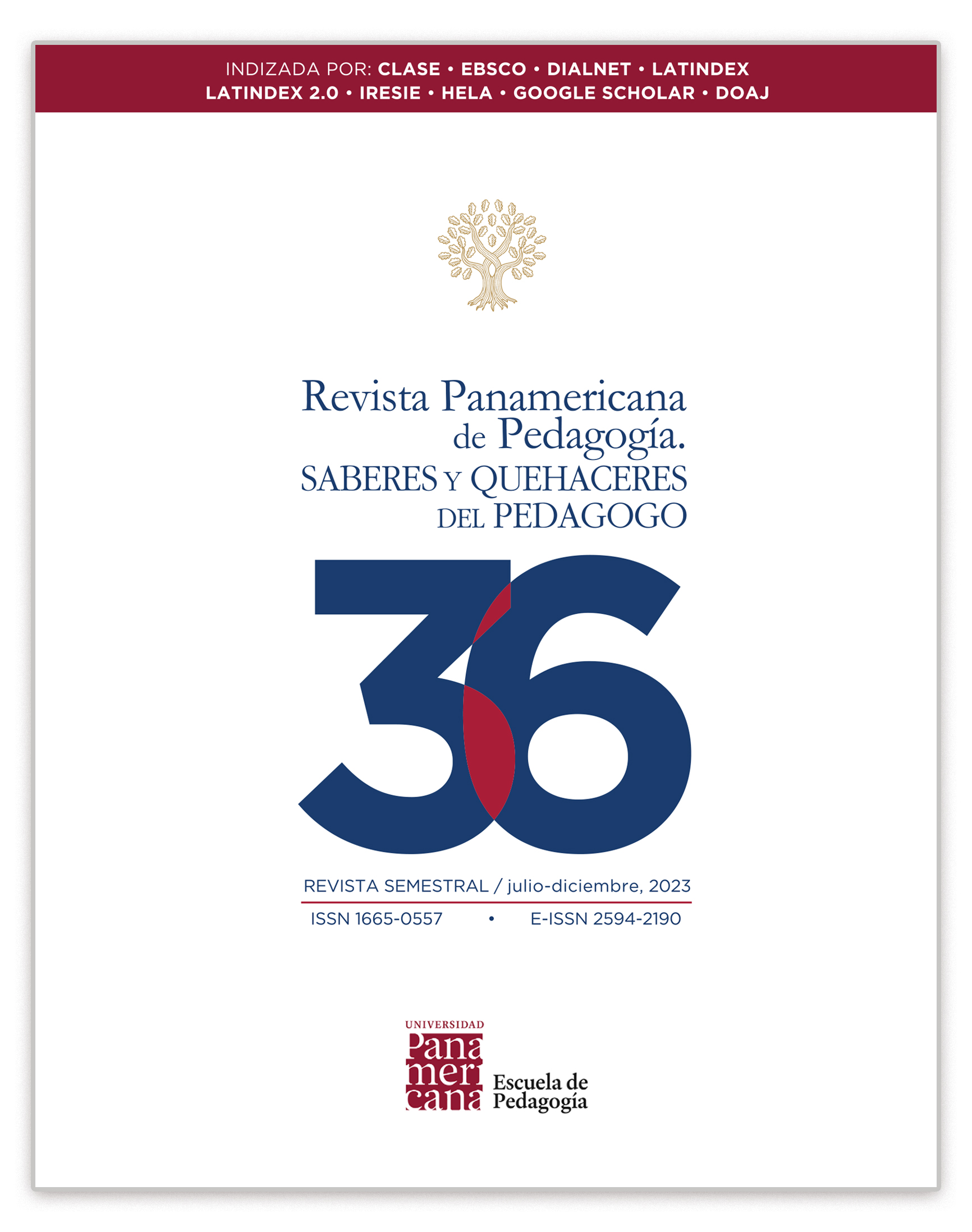LA GESTIÓN COMO PROCESO DE MEJORA DE LA CONVIVENCIA ESCOLAR. EXPERIENCIA DE UN CENTRO EDUCATIVO EN LA NUEVA REGIÓN DE ÑUBLE EN CHILE
Publicado 23-06-2023
Palabras clave
- convivencia,
- clima,
- educación,
- formación,
- gestión educativa
- violencia ...Más

Esta obra está bajo una licencia internacional Creative Commons Atribución-NoComercial-CompartirIgual 4.0.
Cómo citar
Resumen
La presente investigación describe, de manera intensiva y rigurosa, cómo se realizan los procesos de gestión de la convivencia en el centro educativo Instituto Santa María, de la ciudad de San Carlos, en Chile. Se ha planteado un enfoque metodológico mixto de investigación, utilizando un diseño de estatus equivalente de tipo paralelo/simultáneo. Las técnicas de obtención de información utilizadas fueron cuestionarios validados, aplicados a estudiantes, profesores y familias, entrevistas a equipo directivo, autoridades provinciales de educación y grupos de discusión con estudiantes y profesores. Se concluye que el principal gestor de la convivencia es el profesor; se identifica la falta de un programa de convivencia que permita desarrollarla de manera transversal en el centro, ya que no existen procesos formativos estructurados, no existen actividades preventivas y prevalecen las acciones reactivas cuando se presentan dificultades y conflictos que alteran la convivencia.
Referencias
- Antúnez, S. (2012). Una brújula para la dirección escolar: orientaciones para la mejora. SM.
- Arón, A., y Milicic, N. (2000). Climas Sociales Tóxicos y Climas Nutritivos para el Desarrollo Personal en el Contexto Escolar . Revista Psykhé, 9(1), 117-124.
- Becerra, S., Muñoz, F., y Riquelme, E. (2015). Elaboración y validación psicométrica del cuestionario de convivencia escolar para la no violencia (CENVI). Estudios Pedagógicos, 43(3), 205-223.
- Benbenishty, R., Avi Astor, R., Roziner, I., & Wrabel, S. L. (2016). Testing the causal links between school climate, school violence, and school academic performance: a cross-lagged panel autoregressive Model. Educational Researcher, 45(3), 197-206.
- Campo, J. del (2002). La gestión positiva del conflicto: un camino para la convivencia multicultural. En M. Bartolomé (Coord.), Identidad y ciudadanía, un reto para la educación intercultural (pp.163-181). Nancea.
- Cátedra de la Paz (2016). Guía para la implementación de la Cátedra de la Paz en Colombia. Santillana.
- Cerda, G., Salazar, Y., Guzmán, C., y Narváez, G. (2018). Impacto de la convivencia escolar sobre el rendimiento académico, desde la percepción de estudiantes con desarrollo típico y necesidades educativas especiales. Propósitos y Representaciones, 6(1), 247-300. http://dx.doi.org/10.20511/pyr2018.v6n1.194
- Espelage, D., Low, S., y Jimerson, S. (2014). Understanding school climate, aggression, peer victimization and bully perpetration: contemporary Science, Practice, and policy. School Psychology Quarterly, 29(3), 233-237.
- Fierro, C. y Carbajal, P. (2019). Convivencia escolar: una revisión del concepto. Psicoperspectivas, 18(1), 1-14. https://dx.doi.org/10.50.27/psicoperspectivas-vol18-issue1-fulltext-1486
- Konishi, C., Miyazaki, Y. Hymel, S., & Waterhouse, T. (2017). Investigating associations between school climate and bullying in Secondary Schools: multilevel contextual effects modeling. School Psychology International, 38(3), 240-263.
- Leithwood, K., Harris, A., & Hopkins, D. (2020). Seven strong claims about successful school leadership revisited. School Leadership & Management, 40(1), 5-22. https://doi.org/10.1080/13632434.2019.1596077
- Low, S., & VanRyzin, M. (2014). The moderating effects of school climate on bullying prevention efforts. School Psychology Quarterly, (29), 306-319.
- Mendoza, B., y Barrera, A. (2018). Gestión de la convivencia escolar en educación básica: percepción de los padres. Revista Electrónica de Investigación Educativa, 20(2), 93-102. https://doi.org/10.24320/redie.2018.20.2.1729
- MINISTERIO DE EDUCACIÓN [MINEDUC]. (2009). Convivencia Escolar. Gobierno de Chile, Ministerio de Educación. http://www.convivenciaescolar.cl/index.php?id_portal=50
- MINISTERIO DE EDUCACIÓN [MINEDUC]. (2019). Convivencia Escolar. Gobierno de Chile, Ministerio de Educación. http://www.convivenciaescolar.cl/index2.php?id_portal=50&id_seccion= 4010&i_contenido=17916
- MINISTERIO DE EDUCACIÓN [MINEDUC]. (2021). Fortalecimiento de las capacidades locales para la gestión de la convivencia escolar en contexto de epidemia en Chile por la enfermedad Covid-19. Gobierno de Chile, Ministerio de Educación. http://convivenciaescolar.mineduc.cl/wp-content/uploads/2021/03/INFORME-SOBRE-EL-PLAN-DE-TRABAJO.pdf
- Monge, C., y Gómez, P. (2021). El papel de la convivencia escolar en la formación inicial del profesorado de educación infantil y primaria. Teoría de la Educación. Revista Interuniversitaria, 33(1), 197-220. https://doi.org/10.14201/teri.23580
- PAULA (2019). Programa Paula de educación para la paz. Universidad de Barcelona, Portal Paula. http://portalpaula.org
- Penalva, A. (2016). Análisis de la convivencia escolar. Propuesta de un programa de formación para el profesorado [Tesis doctoral, Universidad de Murcia].
- Toledo, M., Guajardo, G., Miranda, C., y Pardo, I. (2018). Propuesta tríadica para el estudio de la violencia escolar. Cinta de moebio, (61), 72-79. https://dx.doi.org/10.4067/S0717-554X2018000100072
- Varela, J., Tijmes, C., y Sprague, J. (2009). Paz Educa. Programa de prevención de la violencia escolar. Fundación Paz Ciudadana.
- Vidal, Ll. (2003). Fundamentos teóricos del día escolar de la paz y la no violencia (DENIP). Educación XXI, (6), 45-67. https://doi.org/10.5944/educxx1.6.0.352






